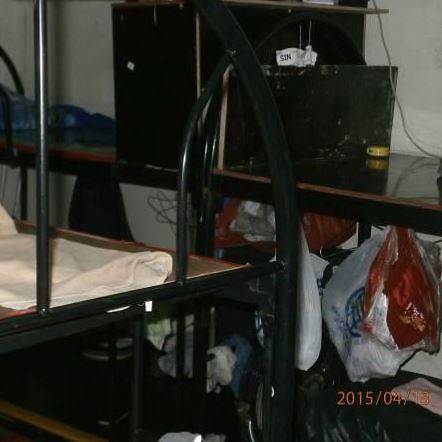SINGAPORE: Two construction company directors have been fined for housing foreign workers in a “severely overcrowded” illegal dormitory, the Ministry of Manpower (MOM) and Urban Redevelopment Authority (URA) said in a joint media release on Tuesday (Apr 23).
The actions of 48-year-old Shi Baoyi and 55-year-old Chen Ming, directors of construction companies Genocean Enterprises and Genocean Construction, saw 66 foreign workers crammed into an adjoining shophouse in Geylang.
Investigations by both authorities found that Genocean Enterprises had rented two adjoining shophouses at Lorong 14 Geylang in January 2015 on a 12-month tenancy agreement.
This property, which had an occupancy cap of eight unrelated persons, was turned into an illegal dormitory and used to house 66 foreign workers.
Bed spaces were added to accommodate the workers, who lived in “severely overcrowded with crammed and unsanitary living conditions”, the authorities said in the release.
The poor living conditions affected the well-being of the foreign workers, the authorities said.

Workers lived in crammed and cluttered conditions in the properties. (Photo: MOM, URA)
Separately, Shi had also allowed his company to illegally house another 15 foreign workers in another overcrowded property at Geylang Road between July and August 2016, the release said.
The properties in Geylang were all converted into workers’ dormitories without planning permission from URA, the release said.
Investigations also revealed that Shi, Chen and Genocean Enterprises had converted a third property at Lorong Kismis, a walk-up apartment, into an unauthorised workers’ dormitory between June and July 2015.
Shi, Chen and Genocean Enterprises were fined a combined S$257,000 for their various offences.
For converting private residential properties into a workers’ dormitory without planning permission, all three were fined S$15,000, S$12,000, and S$60,000 respectively.
For housing foreign workers in poor conditions, Shi and Chen were fined S$70,000 and S$48,000, respectively.
Shi was fined an additional S$52,000 for providing inaccurate and false information to the Controller of Work Passes between August and September 2016 for 12 foreign workers. He had also failed to update the addresses of another 40 foreign workers between March and April 2015.
Genocean Enterprises and Genocean Construction have been barred from hiring foreign workers.

The toilet facilities were unsanitary and inadequate to serve the needs of the foreign workers. (Photo: MOM, URA)
“Converting private residential properties into illegal dormitory accommodation not only affects the well-being of the occupants, but has an adverse impact on neighbours and the surrounding community,” said Mr Timothy Lee, director of URA’s Development Control Department.
Earlier this year, two other companies – Broadley Dormitory Management and Broadley Electrical were convicted on Feb 25 for housing foreign workers in dormitories with overcrowded, poor and unsafe living conditions.
For this, they were fined S$300,000 and S$60,000 respectively.
EMPLOYERS MUST LOOK AFTER WELFARE OF WORKERS: MOM
Stern action will be taken against irresponsible employers who disregard workers’ safety and well-being by housing them in overcrowded and unacceptable living conditions, said Ms Jeanette Har, director of Well-Being Department at MOM’s Foreign Manpower Management Division.
“Together with other agencies, MOM will intensify our inspections on (private residential properties) and send a strong signal that employers must look after the welfare of their workers,” she said.
READ: Dormitory operator faces 50 charges for housing foreign workers in poor living conditions
Employers must provide foreign workers with safe and proper accommodation that meets the statutory requirements, the authorities added.
Those who fail to do so face a fine up to S$10,000 or a jail term of up to 12 months or both, for each charge.
Under the current Planning Act, private residential properties are subject to an occupancy cap of six unrelated persons. Offenders can be fined up to S$200,000, or jailed up to one year, or both.




